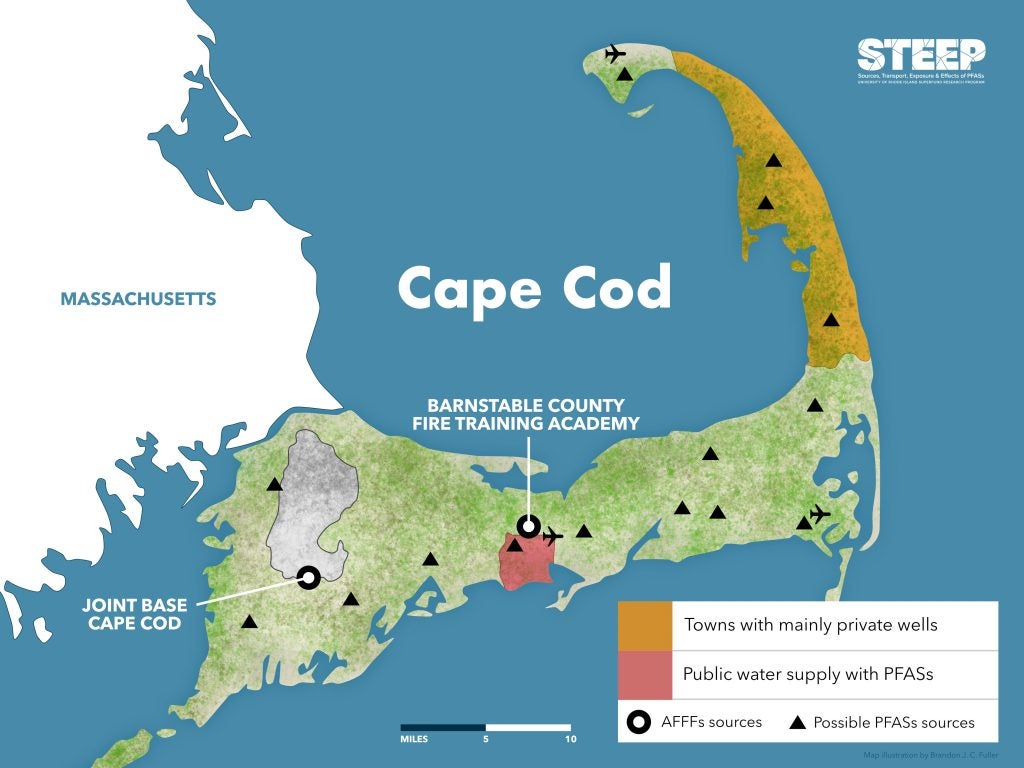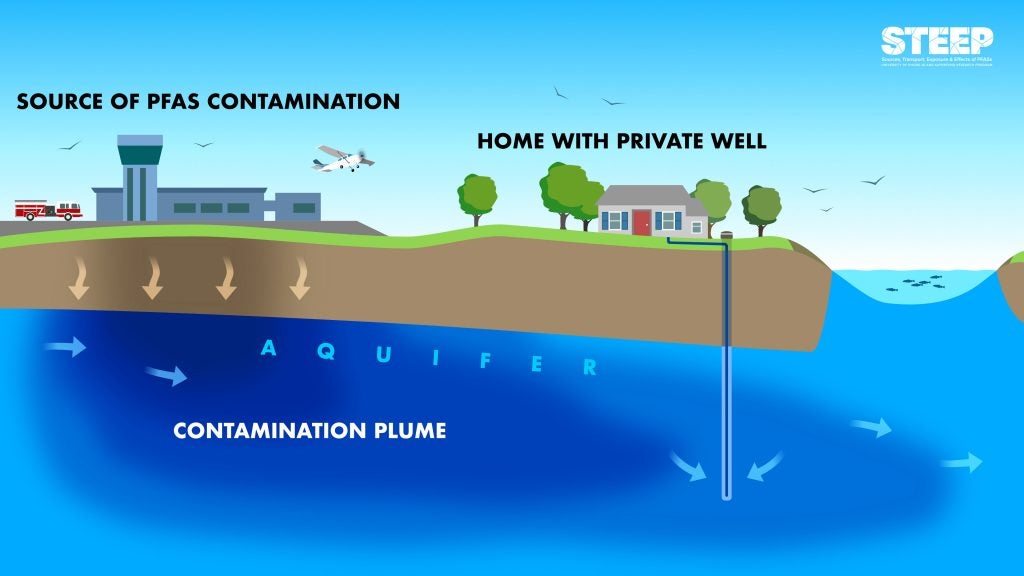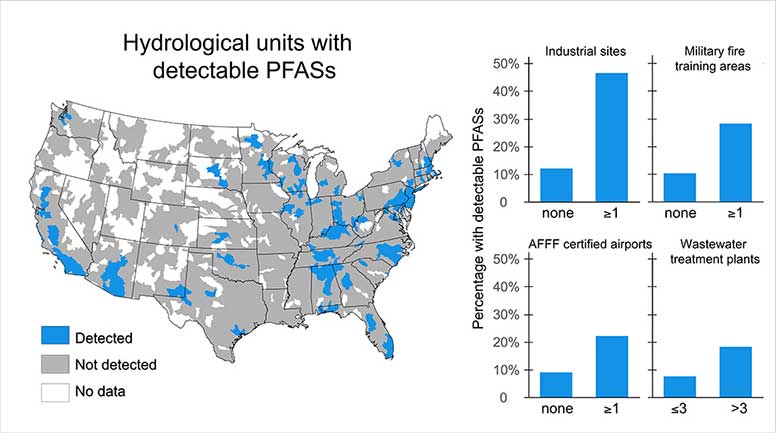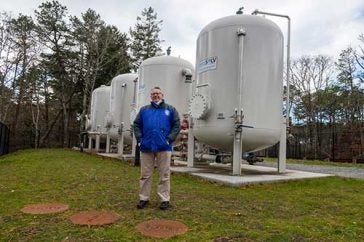Cape Cod

Groundwater on Cape Cod has been contaminated by PFAS from multiple sources. To date, these sources have been identified as fire training areas, airports, military bases, landfills, municipal wastewater biosolids, and private septic systems. The spread of PFAS is exacerbated by Barnstable’s location in an outwash plain with permeable soil. The result is that groundwater aquifers are highly susceptible to movement of contaminants from the surface of the ground—the place where surface water both contributes to aquifers and enters the food web. Given these multiple inputs of PFAS and the unique geology of the area, there is an ongoing threat to Cape Cod’s sole source aquifer that provides drinking water for 200,000 year-round and 500,000 summer residents.
Once PFAS get into groundwater, they move with the groundwater and eventually can contaminate both public and private drinking water sources. Prior research by Silent Spring Institute demonstrated the presence of PFAS in both public and private drinking water wells, which spurred action by the Hyannis Water System in the Town of Barnstable to install activated carbon treatment to remove PFAS. Currently, however, private well owners are not required to test for PFAS, so there is little information about the extent of PFAS contamination in Cape Cod private wells.
Contamination Sources
The primary contamination source that STEEP addresses on Cape Cod is aqueous film-forming foam (AFFF), which are a class of firefighting foams used to fight fuel fires. These AFFFs have been used in firefighting training at the Barnstable County Fire/Rescue Training Academy (BCFTA) and the Joint Base Cape Cod (JBCC). STEEP researchers are assessing the movement of PFAS from AFFF seeping into groundwater to better understand how these chemicals can end up in private drinking water wells and accumulate in food webs. Once in groundwater and food sources, this can lead to human exposure through drinking contaminated tap water or eating contaminated fish.

STEEP’s Community Engagement Core (CEC) works with community members and local officials on Cape Cod to raise awareness of the potential risks of PFAS exposure and to effect behavior change to reduce exposure. CEC leads a private well water testing program to identify areas of the Cape where private wells may be at risk from PFAS contamination. To date they have tested water samples from 101 private wells in 12 towns across Cape Cod. Concurrently, STEEP researchers are working to better understand human health effects, to provide resources focused on minimizing exposure from drinking water and other sources, and to develop more cost-effective ways of testing for PFAS in the environment. The information that STEEP collects by working with the Cape Cod community is available and growing to help address concerns of other similarly contaminated sites throughout the U.S. and globally.
What Are My Risks?

Residents in some parts of Cape Cod, and many other communities across the U.S., have been exposed to elevated PFAS levels through contaminated drinking water. These elevated levels are of particular concern for pregnant women and nursing mothers because in utero and early life exposures are extremely vulnerable periods of development for a fetus and infant. PFAS are linked to a wide range of health effects. They suppress certain immune system functions, particularly in children, impact metabolic and liver functions, and are linked to some cancers and adverse effects on pregnancy, such as low birth weight. Recent research has shown the suppression of the immune system as possibly predictive of a more serious course of disease with COVID-19.
To address community concerns about PFAS and inform local decision-makers, STEEP regularly updates Cape Cod residents on its research, which assesses the extent of PFAS contamination in Cape Cod waters, characterizes human exposure pathways (e.g., drinking water, fish consumption), and analyzes the movement of PFAS in groundwater.
Ways to Reduce Impact

The Hyannis Water System is using effective methods for removing PFOS and PFOA, the two most common PFAS in drinking water. This treatment, coupled with water purchased from other water systems, has brought the levels of PFOS and PFOA in Hyannis tap water below the U.S. Environmental Protection Agency’s 2016 Health Advisory of 70 parts per trillion combined. In addition, several states in the U.S.—among them Massachusetts and Rhode Island, have reduced or are working on legislation to reduce the acceptable standard for PFAS at levels considerably below the 70 ppt now set by the EPA.
Private well owners who learn that their well is contaminated can install treatment, such as activated carbon or reverse osmosis, to reduce PFAS. But it is important to recognize that everyone is exposed to PFAS in multiple ways in addition to drinking water and should take steps to identify and reduce their collective exposure.
There’s not currently a practical way to reduce the level of PFAS already in the body, but it’s important to do as much as possible to limit future exposures. Double-check STEEP’s “What are PFAS?” section for consumer products that contain PFAS, don’t hesitate to contact manufacturers for products that contain PFAS, signup for PFAS updates , and apply this knowledge to everyday choices.
Partners
Many groups are working to protect Cape Cod’s water quality. STEEP’s Community Engagement Core partners with the Massachusetts Breast Cancer Coalition as well as the Sierra Club Cape Cod Group, along with members of STEEP’s Cape Cod advisory committee, to engage with Cape residents and local officials in order to protect water quality and public health.
Massachusetts Breast Cancer Coalition: MBCC is dedicated to preventing environmental causes of breast cancer through community education, research advocacy, and changes to public policy.
Sierra Club Cape Cod Group: The MA Military Reservation is a conservation priority for the Cape Cod Group, focusing on how toxic chemicals from these activities have polluted large portions of Cape Cod’s sole source aquifer for drinking water.
Cape Cod Advisory Committee
Members:
- Tom Cambareri, Sole-Source Consulting, formerly Cape Cod Commission
- Jane Crowley, Health Agent, Town of Eastham
- Chuckie Green, Former Director, Natural Resources Department, Mashpee Wampanoag Tribe of Massachusetts
- Hans Keijser, Supervisor, Barnstable Department of Public Works, Water Supply Division
- Keith Lewison, Chair, Sierra Club Cape Cod Group
- Sean O’Brien, Director, Barnstable County Department of Health and Environment
- Dan Santos, Director, Department of Public Works, Town of Barnstable
Facilitators:
- Alyson McCann, University of Rhode Island, STEEP CEC Co-leader
- Laurel Schaider, Silent Spring Institute, STEEP CEC Co-leader
- Cheryl Osimo, Executive Director, Massachusetts Breast Cancer Coalition, and Silent Spring Institute Cape Cod Coordinator

